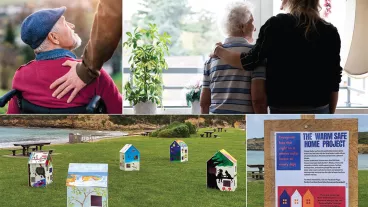Almost one in six older Australians report experiencing abuse in the last 12 months
December 2021
Download Media release
The National Elder Abuse Prevalence Study found that the most common form of elder abuse was psychological abuse (11.7%), followed by neglect (2.9%), financial abuse (2.1%), physical abuse (1.8%) and sexual abuse (1%). Some older people (3.5%) experienced more than one type of abuse, with the most common combination being psychological abuse and neglect.
One of the report’s co-authors, AIFS Deputy Director of Research, Dr Rae Kaspiew, said the findings reveal a significant hidden problem in Australia.
"That only a third of victims are seeking help from a third party is a real concern. When abuse remains hidden, this creates the conditions for the abuse to continue," said Dr Kaspiew.
The study found that perpetrators were mostly family members, with adult children the most likely to commit abuse, making up almost one fifth of perpetrators. Friends (12%), neighbours (7%) and acquaintances (9%) were also cited as commonly responsible.
"The fact that it’s often the people closest to them who are committing the abuse is particularly concerning, as this can create a desire by the victim to keep the abuse a secret to avoid shame, embarrassment and negative repercussions for the perpetrator – especially when it comes to family members," said Dr Kaspiew.
The research reports that the most frequent action taken to stop the abuse involves the victim speaking directly to the perpetrator. Another common measure is breaking contact with or avoiding the perpetrator, though Dr Kaspiew warns this may make the impact of the abuse worse, by increasing the older person’s isolation.
"Breaking contact with or avoiding the perpetrator may serve to further exacerbate the effects of the abuse on the older person because of their social withdrawal.
"Family dynamics can make abuse difficult to address. For example, when the abuse is perpetrated by an adult child, the older person may be reluctant to expose the abuse to avoid losing contact with other family members such as grandchildren," said Dr Kaspiew.
When victims do seek help or advice from a third party, family (41%), friends (41%), and general practitioners or nurses (29%) are the most common sources of support.
Dr Kaspiew said that while anyone can experience abuse, there are certain characteristics that put older people more at risk.
The report found that lower socio-economic status, being single, separated or divorced, living in rented housing, owning a house with a debt against it and poor physical or psychological health are all features that are associated with a higher risk of abuse.
"Elder abuse is something that can happen to anyone, no matter their circumstances. It’s important that we do everything we can to reduce the abuse and its impacts," said Dr Kaspiew.
"Evidence tells us we can do this by introducing strategies to reduce the vulnerability of older people to abuse, developing greater measures to raise awareness of elder abuse and the services available to help, as well as improved screening for and assessment of situations where elder abuse may be occurring," she said.
Anyone concerned about their safety, or concerned about the safety of a loved one, can call the national free and confidential phone number 1800 ELDER Help (1800 353 374). Callers seeking information and advice on elder abuse are automatically directed to a phone service in their state or territory.
National Elder Abuse Prevalence Study is based on a survey of a representative sample of 7,000 people aged 65 and over living in the community (ie they did not live in residential aged care settings). These findings provide estimates of how many people aged 65 and over have experienced elder abuse in the past 12 months. They also assess the most common forms of abuse, the characteristics of those who are most likely to experience abuse, who commits abuse and what people do when they experience abuse. It was commissioned and funded by the Australian Government Attorney-General’s Department.
Media contact
Kate O'Connor
Phone: 0499 860 257
Email: kate.o'[email protected]
Related publications

National Elder Abuse Prevalence Study: Summary report
This report summarises the findings of a nationally representative survey of 7,000 people aged 65 and over living in…
Read more
National Elder Abuse Prevalence Study: Final Report
This report presents findings from the most extensive study on elder abuse in Australia to date.
Read more